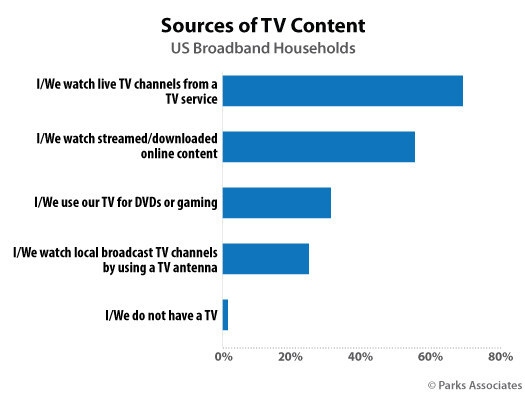Parks Associates: TV Antenna Usage in US Broadband Households Jumped to 25% In 2019 and is Expected to Grow More as COVID-19 Keeps Consumers at Home
Consumer research study finds TV antenna use has increased and predicts more widespread usage as people shelter in place
New consumer research from Parks Associates finds that 25% of US broadband households use an antenna to watch local broadcast TV channels, up from 15% in 2018. 360 Deep Dive: Today’s Broadcast TV also reports that roughly one-half of antenna users do not subscribe to any pay-TV services, either traditional or vMVPD services.

The study, conducted in the third quarter of 2019, examines the demand for broadcast TV, including pay TV, over-the-air, and online sources. The survey finds households that watch over-the air TV channels watch more video overall than average broadband households.
“Local news matters to most households—local broadcast channels are the most preferred channel types, and news is the most preferred broadcast content,” said Steve Nason, Director of Research, Parks Associates. “These content preferences shape the access habits of consumers, so antenna usage is increasing as households look to meet these needs, and we will see these trends increase as more shelter-in-place orders take effect and households look for inexpensive content options to offset lost wages.”
Recommended AI News: Chainalysis And Paxful Create New Compliance Standard For Peer-To-Peer Cryptocurrency Exchanges
Overall 78% of US broadband households watch live TV channels. As households look to cut expenses, their reliance on antennas for information and entertainment will likely increase.
“Penetration of broadcast TV and antennas increased markedly in 2019,” Nason said. “Thirty percent of US broadband households report owning a TV antenna, and we expect upward trends both in ownership and usage to continue, especially as we face this public health crisis keeping people at home.”
Recommended AI News: 5 Technical Things you Should Know about Regression Testing and Retesting
360 Deep Dive: Today’s Broadcast TV, a Quantified Consumer study, profiles consumers of live content and ownership of TVs and antennae among live TV viewers. The research quantifies the shift in live content to online platforms and the role that live TV plays in the lives of connected consumers.
Parks Associates is launching multiple surveys in April 2020 to quantify the impact of the COVID-19 outbreak on consumer behaviors, purchasing, and usage of connected devices and services, titled COVID-19 Impact on Communications and Entertainment and COVID-19 Impact on Telehealth and Independent Living.
Recommended AI News: The Environmental Impact of Your Favorite Movies And Shows

Comments are closed, but trackbacks and pingbacks are open.